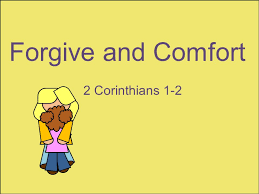STEEMCHURCH: how to FORGIVE and COMFORT those who hurt you

Forgiveness is one of the hardest things for us to do for ourselves, and for others. You might say, “I just can’t forgive, it hurts too much”. To forgive seems to go beyond our natural capabilities. When we have been wronged by someone, a barrier is formed in our hearts. We put up a wall to the offense that hinders us from forgetting, letting go, and moving on.
Matthew 18:21-22 reads: "Then Peter came to Him and said, ‘Lord, how often shall my brother sin against me, and I forgive him? Up to seven times?’ Jesus said to him, ‘I do not say to you, up to seven times, but up to seventy times seven".
Forgive and comfort.

image source
Honestly, am not in support of those two words next to each other.
Not at all.
In fact, if it were up to me, those words would be as far away from each other as they could possibly get.
“Forgive and then ignore,” I like.
“Comfort those who are always kind to you,” I like.
“Forgive and comfort,” I don’t like.
But have come to understand that forgive and comfort are what we need as a christain to be at peace with each other. However, we are called to Forgive and comfort those who have hurt us. It’s in the Bible.
Be tolerant with one another and forgive one another whenever any of you has a complaint against someone else. You must forgive one another just as the Lord has forgiven you. – Colossians 3:13 (GNTD)
Learning how to forgive others is one of the most unnatural duties in the Christian life. It goes against our human nature. Forgiving is a supernatural act that Jesus Christ was capable of, but when we are hurt by someone, we want to hold a grudge. We want justice. Sadly, we don't trust God with that.
There is a secret to successfully living the Christian life, however, and that same secret applies when we're struggling with how to forgive
How to Forgive and Comfort: Understanding Our Worth

image source
We are all wounded. We are all inadequate. On our best days, our self-esteem hovers somewhere between feeble and fragile. All it takes is disapproval—or perceived disapproval—to send us staggering. These attacks bother us because we forget who we really are.You believe in and like yourself. Self-esteem is confidence in one’s own worth or abilities. You are comfortable with who you are — your weight, height, and everything that makes and represents you. You are confident in the work you deliver and your sense of professionalism. You like and have a great relationship with people. I think that without positive self-esteem it would be difficult to know your value.
As believers, you and I are forgiven children of God. We have been lovingly adopted into his royal family as his sons and daughters. Our true worth comes from our relationship to him, not from our appearance, our performance or our net worth. When we remember that truth, criticism bounces off us like BBs ricocheting off a rhino. The trouble is that we forget.
We seek others' approval. When they reject us instead, it hurts. By taking our eyes off God and his acceptance and putting them on the conditional acceptance of our boss, spouse, or friend, we set ourselves up to be hurt. We forget that other people are incapable of unconditional love.
How to Forgive and comfort: Understanding Others

image source
Life is sometimes unkind and there are many living in despondence and despair. There are many with hearts that are broken, with dreams that are shattered, and with needs so heavy that they are burdened down to a point that they believe is beyond all hope and they have no thankfulness in the hearts
Even when other people's criticism is valid, it's still hard to take. It reminds us that we have failed in some way. We didn't measure up to their expectations, and often when they remind us of that, tact is low on their priority list.
Sometimes our critics have ulterior motives.
An old proverb from India goes, "Some men try to be tall by cutting off the heads of others." They try to make themselves feel better by making others feel bad. You have probably had the experience of being put down by a nasty remark. When that happens, it is easy to forget that others are broken just like us.
Jesus understood the brokenness of the human condition. No one knows the human heart like him. He forgave tax collectors and prostitutes, and forgave his best friend Peter, for betraying him. On the cross, he even forgave the people who killed him. He knows that humans—all humans—are weak.
For us, though, it usually doesn't help to know that those who have hurt us are weak. All we know is that we were injured and we can't seem to get over it. Jesus' command in the Lord's Prayer seems too hard to obey: "And forgive us our debts, as we also have forgiven our debtors." (Matthew 6:12, NIV)
How to Forgive and comfort : Understanding the Trinity's Role

image source
How to Forgive and comfort : Understanding the Trinity's Role
Scripture shows how each member of the Trinity fulfills His specific role, and it also reveals how those three roles interrelate. Let me express this idea in simple terms: The Father creates a plan, Jesus Christ implements the plan, and the Holy Spirit administers the plan.
When we have been hurt, our instinct is to hurt back. We want to make the other person pay for what they did. But exacting revenge steps over the line into God's territory, as Paul warned,
Do not take revenge, my dear friends, but leave room for God's wrath, for it is written: "It is mine to avenge; I will repay," says the Lord.
(Romans 12:19, NIV)
If we cannot take revenge, then we must forgive. God commands it. But how? How can we let it go when we have been unjustly hurt?
The answer lies in understanding the Trinity's role in forgiveness. Christ's role was to die for our sins. God the Father's role was to accept Jesus' sacrifice on our behalf and forgive us. Today, the Holy Spirit's role is to enable us to do those things in the Christian life we cannot do on our own, namely forgive others because God has forgiven us.
Refusing to forgive leaves an open wound in our soul that festers into bitterness, resentment, and depression. For our own good, and the good of the person who hurt us, we simply must forgive. Just as we trust God for our salvation, we have to trust him to make things right when we forgive. He will heal our wound so we can move on.
In his book, Landmines in the Path of the Believer, Charles Stanley says:
We are to forgive so that we may enjoy God's goodness without feeling the weight of anger burning deep within our hearts. Forgiveness does not mean we recant the fact that what happened to us was wrong. Instead, we roll our burdens onto the Lord and allow Him to carry them for us.
Rolling our burdens onto the Lord—that's the secret of the Christian life, and the secret of how to forgive. Trusting God. Depending on him instead of ourselves. It's a hard thing but not a complicated thing. It's the only way we can truly forgive.
Thanks for reading
